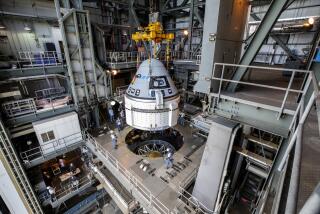Considered Engineers’ Data Illogical, NASA Official Says : Did Not Know Extent of Dissent, He Says, Might Have Delayed Launching
- Share via
WASHINGTON — A NASA manager testified today that he challenged the shuttle no-go recommendation of the booster rocket builder because the conclusions of its engineers were illogical, but he said he did not know the extent of the company’s dissent.
Lawrence Mulloy said he might have changed his mind if he had been told that all or most of the Morton Thiokol Inc. engineers had thought that a launch was unsafe because cold weather might harm critical rocket seals.
Another space agency official, George Hardy, told the presidential commission investigating the explosion of Challenger four weeks ago that any suggestion that safety was disregarded by NASA “does a great disservice to many dedicated, committed professionals.”
“I would hope that simple logic would suggest that no one in their right mind would knowingly accept increased flight risks for a few hours of schedule,” said Hardy, deputy director of science and engineering at NASA’s Marshall Space Flight Center in Huntsville, Ala.
Engineers Overruled
After Mulloy and Hardy objected to Thiokol’s initial recommendation that the launch be delayed until the weather warmed, four Thiokol vice presidents met and overruled the company’s engineering staff, giving NASA the go-ahead.
Mulloy, manager of the booster rocket project office at Marshall, said under intense questioning by members of the presidential panel that he and other NASA officials did not tell Morton Thiokol to reconsider its refusal to recommend a launch.
Mulloy said he did not report Thiokol’s reservations to Arnold Aldrich, NASA’s shuttle program manager at the Johnson Space Center in Houston, or to shuttle chief Jesse Moore. Moore has since been replaced by Rear Adm. Richard Truly, a former astronaut.
Mulloy and Hardy said they did not believe that they had pressured Thiokol managers into changing their recommendation--as had been suggested in testimony by Thiokol employees Tuesday. (Story on Page 12.)
New Shuttle Favored
In a separate hearing before a House subcommittee, acting NASA Administrator William Graham and Air Force Under Secretary Edward Aldridge said they would like to see a new shuttle built to replace Challenger.
“It’s essentially a national emergency,” Aldridge said of the loss of the shuttle’s cargo-carrying capacity.
Challenger blew up 73 seconds after launch Jan. 28, killing its crew of seven, including New Hampshire schoolteacher Christa McAuliffe.
Mulloy said Thiokol engineers did not specifically recommend that Challenger not be launched but said shuttles should not fly in weather conditions colder than 53 degrees. The weather forecast for launch morning was for sub-freezing temperatures.
‘Surprising Conclusion’
“This was a rather surprising conclusion based on data that didn’t seem to hang together. So I challenged that,” Mulloy said. “It came as somewhat of a surprise to me.”
Mulloy said he disagreed with the logic used by Thiokol engineers and was challenging their conclusions, not a recommendation against a launch.
“Yesterday in the testimony that was given before this commission and before that, I think, in more dramatic statements that have been attributed to Thiokol personnel by the media, a picture has been painted of the events of January 27 that I think at best may be misleading,” Mulloy said.
More to Read
Sign up for Essential California
The most important California stories and recommendations in your inbox every morning.
You may occasionally receive promotional content from the Los Angeles Times.













